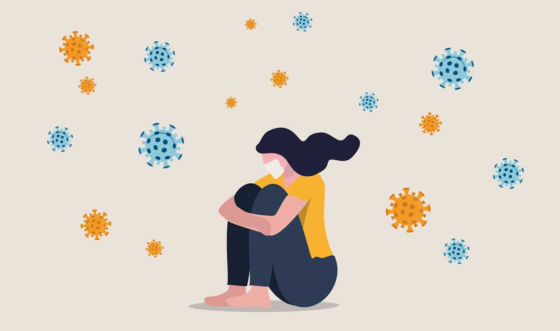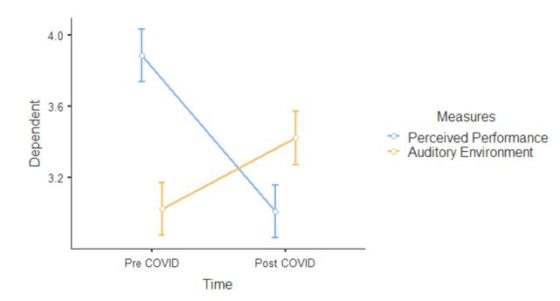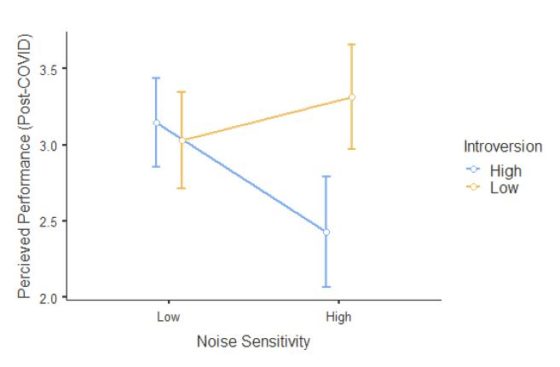Autumn Cox, Christian Galleo, & Celine Taylor (Advisor: Chris Buchholz)

Background Information
Our study investigated how COVID-19 suddenly reshaped the school environment and whether this change has influenced introverts’ and extraverts’ perceived performance differently. While previous research from Teichner, Areess, and Reilly (1963) has examined the relationship between one’s degree of extraversion and the impact noise has on performance, there has been little research into how COVID-19 has modified today’s learning environment. This study intended to examine the auditory changes COVID-19 has had on the work environment and how this has affected introverts’ and extroverts’, and their perceived performance. We hypothesized that introverts would be more adversely affected by their home’s auditory environment and that they would have a larger decrease in perceived performance from pre-COVID-19 to the present. Meanwhile, we predicted that extraverts would not be as adversely affected by the auditory environment and may even display a slight increase in their perceived performance compared to their pre-COVID-19 perceived performance rating.
Methods
Ninety-four participants from Roanoke College completed our online survey. Participants completed measures of introversion/extroversion, as well as a Perceived Performance Questionnaire, Change in Auditory Environment Questionnaire, and a Noise Sensitivity Questionnaire (measures how sensitive an individual is to auditory disruptions while working). Many of these scales were created to evaluate how variables such as auditory environment and perceived performance changed from before COVID-19 to now, so that we can examine whether perceived performance has been negatively impacted by environmental changes.
Results & Discussion
Our analysis revealed that our results supported several of our hypotheses; college students indicated that not only had their auditory environment become more distracting but that their performance had worsened during the COVID-19 crisis (see Figure 1). When evaluating the relationship between time period (Pre-COVID-19, Post-COVID-19), perceived performance, and auditory environment, we found that both perceived performance and auditory environment were negatively impacted by COVID-19. This indicates that COVID-19 is responsible for increasing the amount of auditory disturbances that are experienced while working and that it has also decreased students’ perceived performance.
 Figure 1. The effect that time period has on auditory environment and perceived performance
Figure 1. The effect that time period has on auditory environment and perceived performance
Our results also supported our prediction that introverts would be more sensitive to noise disturbances, and that introverts would also have lower levels of post-COVID-19 perceived performance than extraverts would. A possible explanation for the poorer performance may be that introverts are more sensitive to noise disturbances, which means that an increase in auditory disruptions, caused by COVID-19, would result in this group’s poorer perceived performance. This supports Eysenck’s theory of personality, which theorizes that introverts’ performance would be more adversely affected by, in this case, their sensitivity to noise disturbances than extroverts would be (Eysenck, 1997). Therefore, the more sensitive an introvert (i.e. high introversion) is to noise the worse their perceived performance is, but the more sensitive an extravert (i.e. low introversion) is to noise the better their perceived performance is (see Figure 2). Overall, our results indicate that the current school environment has been detrimental to the introvert’s perceived school performance and should be changed.
 Figure 2. The effect that introversion level has on an individual’s noise sensitivity and perceived performance after COVID-19.
Figure 2. The effect that introversion level has on an individual’s noise sensitivity and perceived performance after COVID-19.
Reflection
The data collection process was a limitation because we could only obtain participants through Roanoke College’s SONA system which limited our pool of participants. Our limitations also included a lack of accessible research, the convenience sample, and the necessity to develop many of our own measures. Although there is very little research available, we learned how greatly COVID-19 has impacted the work and school environment and believe that further efforts should be made to understand the impacts of this ongoing pandemic.
Conclusion
Our results indicate that the new work environment, initiated by COVID-19, has not adversely affected extraverts and their perceived performance, which suggests that they may be able to continue functioning in this work environment after the conclusion of the COVID-19 pandemic. However, our results also indicate that the new work environment has brought on higher levels of auditory distractions into the work environment, which have negatively impacted introverts and their perceived performance. Our results indicate that, as COVID-19 comes to a close, employers and schools should give introverts the opportunity to return to their work environment and to work in a quieter environment that maximizes their performance.
References
Eysenck, H. J. (1977). Personality and factor analysis: A reply to Guilford. Psychological Bulletin, 84, 405-411.
Teichner, W. H., Arees, E. & Reilly, R. (1963). Noise and human performance, a psychological approach. Ergonomics, 6, 83-97.